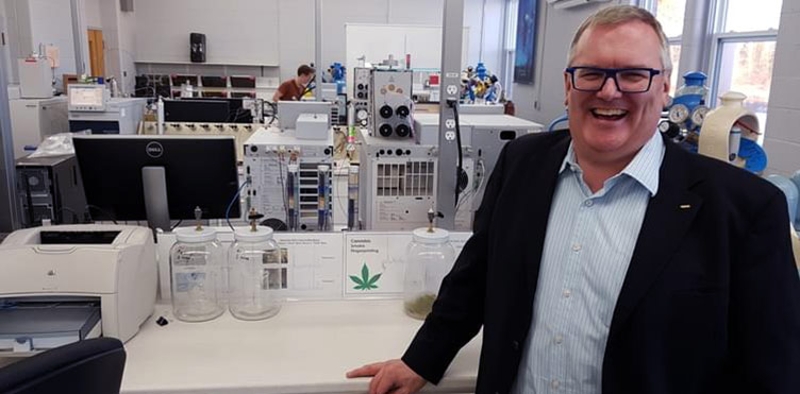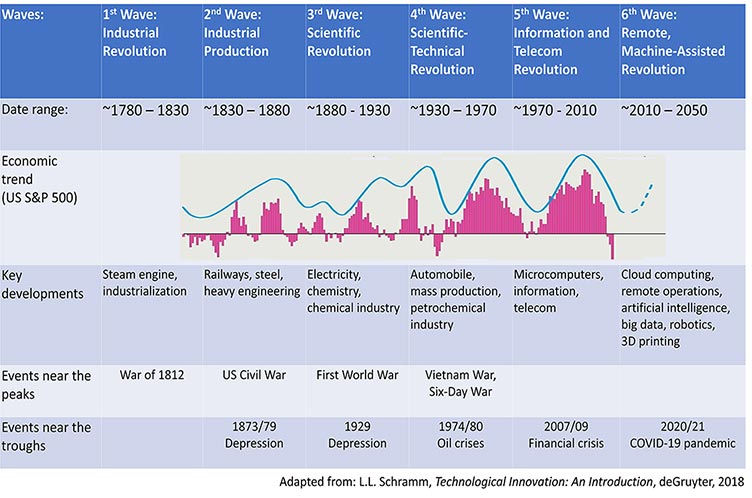Sustainability and Economic Opportunities Post COVID-19
Author: UNB Alumni
Posted on Jun 30, 2020
Category: Engineering , Insights

Eric Cook on The Sixth Wave
COVID-19 is punishing the economy at a level beyond any crisis in modern times. Shutting down our economy will result in business failures, high unemployment and permanent changes in the economy. It is natural to focus on the negative impacts of the COVID-19 crisis, however, there will be opportunities for those with the foresight, agility and resources to pursue them.
Waves of innovation, called Kondrattieff waves, have long been observed to drive waves of economic growth. The theory is that each wave is driven by a confluence of key technological, social, political and economic events, and that each wave includes the seeds of the next, with one or more triggers causing the next wave to begin. The waves used to repeat over a period of 40 to 60 years, but in the 20th and 21st centuries the cycle time has been shortening, in keeping with a faster-moving world. As the chart suggests, the sixth wave of innovation is just beginning.

Many observers thought that the 2007/09 financial crisis would be the trigger for the sixth wave of innovation. The earlier crisis plus the COVID-19 pandemic crisis could be the 1-2 combination to trigger the sixth wave of innovation, similar to the Spanish flu/depression combination that sparked the fourth wave of innovation in 1918/1929.
Only history will show what makes up the sixth wave of innovation, but a common theme – so far – involves the ability to operate remotely, the power of a new generation of computing approaches, and the increased use of robotics and automation to assist human workers. Accordingly, the sixth wave may come to be known as the Remote, Machine-Assisted Revolution.
Events at the trough
COVID-19 and Changing Consumer and Business Sentiments
A Value on Security of Supply, leading up to the crisis, the trend in purchasing strategies was to focus on price, even at the expense of quality and delivery. During COVID-19, businesses have recognized that suppliers who can guarantee quality and supply are more important. There may now be a willingness to pay a premium for security of supply.
A Step Back from Globalization, businesses have quickly realized how fragile the global supply chain can be. For some industries, the answer could be more localized manufacturing and production – even if it costs a bit more. This could drive demand for advanced manufacturing.
Food Security, Canada is a net exporter of food and Canadians tend to take food security for granted. There have already been signs of countries hoarding food and causing exports to be reduced or restricted. More local food production is an obvious solution, and consumers may be prepared to pay a premium for secure and safe food. NB has many opportunities in the food sector spanning land and aquaculture.
Embracing Science, leading up to the crisis, there was a fraction of the general public who were anti-science and anti-vaccine. In the trough of the COVID-19 pandemic, countries that have relied on the best available scientific advice are clearly faring better than those that have relied on instinct and/or desires. In addition, there are already media reports of former ‘anti-vaxers’ rethinking their beliefs. This could lead to increased public support for evidence-based decision making in all spheres of life.
Digital Health, the crisis has already accelerated the adoption and use of digital health, in which physicians and professional counsellors are ‘seeing’ patients virtually. In Saskatchewan, robots are being deployed to ‘see’ patients in hospitals. There is a national challenge to develop sensors and monitoring equipment. Post COVID-19, the digital health industry will be here to stay. New Brunswick has a digital health initiative; this is the time to accelerate it and seize market share.
Continued Environmental Consciousness, leading up to the crisis there was growing public concern about the environment. In some cases, the passion overcame science and logic. Going forward these concerns will surely be renewed, but perhaps in a way that embraces science and its applications in a more measured, rationalized approach.
Other Probable Trends, increased working from home, e-learning and e-marketing – all in evidence today – may endure past the crisis, resulting in reduced demand for trade shows, travel and office space. The term ‘cocooning’ was coined by Faith Popcorn in 1991, during the AIDS crisis to refer to people staying at home more often, building home theater rooms and gourmet kitchens. Today’s cocooning may also endure to some extent.
Changing government sentiments
Infrastructure and Mega Project Stimulus. Mega projects can provide stimulus to an economy in recession. One project of interest is the Canadian Northern Corridor™, which envisions a multi-modal transportation and transmission corridor across Canada's North and Near-North. There is an abundance of economic opportunity and a population willing to embrace it providing the proper environmental regulations are enforced. To unlock the opportunity, they need energy supply, transportation infrastructure and high-speed telecommunications. New Brunswick has much to offer, from small modular reactors (SMRs), through full-cycle mining, pre-fabricated housing, smart grids, eDNA, and environmental-analytical chemistry, to name only a few. It is fair to say the arctic is a good fit for New Brunswick if we seize the opportunity early.
Smart Cities. This movement began pre-COVID-19 but may be accelerated. The ability to remotely monitor and control infrastructure, and the power of ‘big data’ approaches, will be a strategic advantage during an event such as COVID-19.
Companies that Can Scale. In driving economic recovery, governments will look to companies with a proven track record that have the potential to scale. These will be the most likely to quickly ramp up.
Governments in Economic Distress. The costs of COVID-19 to the federal and provincial governments will be enormous. In an effort to balance budgets, governments will be searching for more efficient ways to deliver services, new sources of tax revenues and new incentives to attract private capital.
Embracing Market-Driven Innovation. There are numerous examples of businesses transforming their operations and developing new products to assist in the fight against COVID-19. Market driven innovation is a need identified in the marketplace plus creativity and technology applied to generate a solution, plus deployment to generate economic and/or social value. Whereas Canada's 'innovation strategy' has recently focused on discovery research and invention, the current crisis has forced governments to search for deployable solutions. This is a catalyst for true innovation and may drive policy change.
Seeds in the sixth wave
A sustainable planet
The sixth-wave technologies identified above have already begun to enable more sustainable and efficient uses of resources. Sustainable resource development will be a critical enabler of a sustainable planet. To get there will require numerous technologies. The next steps are to develop and deploy the applications of the technologies which will include:
Sustainable Health Care, enabled by digital health care technologies, increased use of sensors for proactive and preventive health monitoring, technology to allow for care without professional health skills, application of artificial intelligence, increased use of genetics for early detection and treatment, and big data applications,
Sustainable Energy, enabled by smart grid, off grid, smart pipelines, renewable energy, small modular reactors, conservation/energy efficiency technologies, and biofuels,
Sustainable Resource Development, enabled by biomimicry, green mining technologies, robotic mining, advanced environmental monitoring, comprehensive ultra-trace chemical analyses, and big data,
Sustainable Food, enabled by reduced use of pesticides, increased use of genetic engineering, biopesticides, organic farming, localized food production, greenhouse technologies, multitrophic aquaculture, irrigation technologies, sensing technologies, and probiotics, and
Sustainable Manufacturing, enabled by advanced (robotic) manufacturing technologies, machine learning, artificial intelligence, life-cycle design, flexible manufacturing, and localized manufacturing.
Conclusion
The COVID-19 crisis has had a devasting impact on our economy. It will have a lasting impact and will provoke change. While organizations are rightfully focused on dealing with the immediate impacts of the pandemic, the current crisis also presents substantial opportunities to be aspirationally strategic. Organizations that can anticipate these opportunities and proactively adapt their operating practices, products and services to meet new demands, are likely to thrive.
It is likely that the combination of the 2008 economic crisis and the 2019 COVID-19 crisis will simulate the sixth wave of innovation. If so, the new technologies that will emerge are not sufficient by themselves: we will need effective adoption of those technologies. The greatest impacts of such adoption may lie in advancing our societies closer to the goal of achieving a Sustainable Planet.
The sixth wave is good news for New Brunswick as it plays to our strengths and our economy.
Eric Cook (BScME’88) is executive director and CEO of the NB Research and Productivity Council. Laurier Schramm is past-president and CEO of the Saskatchewan Research Council.